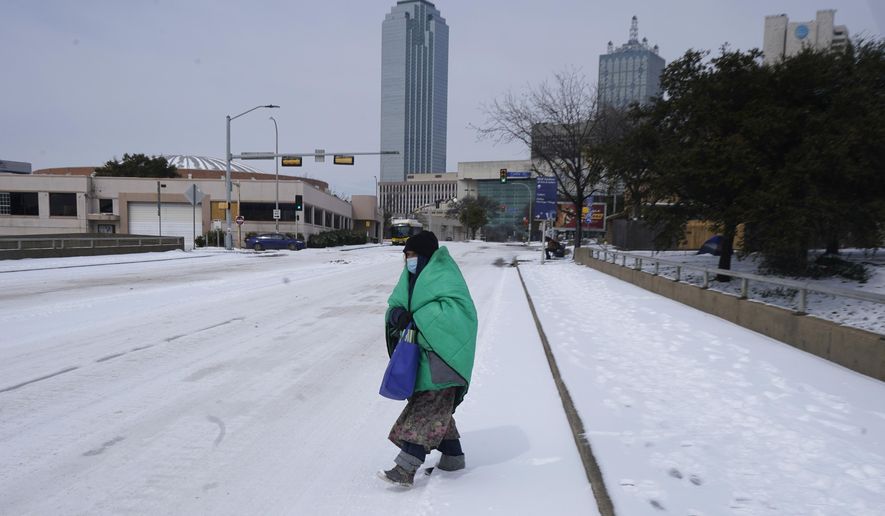OPINION:
Senate Majority Leader Chuck Schumer (D-NY) and other climate alarmists are attempting to take advantage of last week’s tragic extreme cold event in Texas last to spread the myth that climate change caused the cold outbreak or makes such extreme cold outbreaks more likely to occur. In reality, the scientific data are clear – extreme cold events are becoming less frequent rather than more frequent in recent decades. If climate change is having an impact on extreme cold events, it is clearly to lessen the chances of last week’s extreme cold tragedy.
The National Oceanic and Atmospheric Administration (NOAA) publishes climate summaries for each state. For each state, NOAA documents either the frequency of very cold days, in which temperatures do not rise above freezing, or the frequency of very cold nights, in which temperatures drop below zero degrees. For Texas, the NOAA data show the number of days each year with high temperatures failing to make it above freezing has been declining during the past 25 years. Very cold days were most frequent between 1960 and 1990. By contrast, two of the past three five-year periods brought Texas fewer very cold days than normal, and three of the past five five-year periods brought fewer very cold days than normal.
The states neighboring Texas show an even greater reduction in extreme cold events.
In Oklahoma, all five of the past five-year periods brought a below-average number of very cold nights with temperatures dropping below zero. Oklahoma has not experienced an above-average frequency of very cold nights since the 1980s.
In Louisiana, every five-year period in the current century has brought an average or below-average number of very cold days where temperatures do not climb above freezing. The last time Louisiana experienced more-frequent-than-average outbreaks of very cold temperatures was during the 1990s.
In New Mexico, five of the past six five-year periods have brought a below-average number of very cold nights with temperatures dropping below zero degrees.
In Arkansas, the last time there was an above-average frequency of very cold nights with temperatures dropping below zero degrees was in the 1980s.
In summary, for Texas and every state that borders Texas, extreme cold events are becoming a rarer event.
The fact that global warming – or “climate change” – is reducing the frequency of extreme cold events does not mean that extreme cold events no longer occur. They still do occur, but occur less frequently. That being the case, it defies science and common sense to claim that climate change caused last week’s cold outbreak in Texas or made the cold outbreak more likely to occur.
For additional confirmation, we need merely listen to what climate activists themselves have been saying for years. Just last month, the climate activist website Climate Central published an article titled “2021 Fewer Cold Nights & Groundhog Day.” The article warned, “89% (217) of 245 cities have fewer cold nights since 1970. … The decline in colder days and nights has consequences, including economic disruptions in winter recreation and the extension of disease-carrying tick and mosquito seasons.”
Back in 2014, Texas climate activist Katharine Hayhoe warned about the Austin, Texas, climate, “Nighttime temperatures that drop below freezing are projected to become increasingly more rare.”
Also, climate activists frequently claim that increasingly rare extreme cold events are allowing more bark beetles to survive winter and damage forests throughout the United States. For example, the New York Times claimed in a 2017 article, “the year’s coldest nights — which determine whether they survive the winter — have warmed by as much as 7 degrees Fahrenheit.”
Imagine how much worse the Texas tragedy would have been if temperatures were another 7 degrees colder.
Even the aforementioned Climate Central claimed in a 2013 article, “Meanwhile the beetles, whose numbers would normally be held in check by cold winters that kill their larvae, are surviving in greater numbers from one year to the next as winters in the U.S. continue to get warmer.”
That is at odds with what climate alarmists are saying this past week after the Texas cold outbreak.
Climate activists cannot have it both ways. Global warming cannot be causing severe cold outbreaks at the same time it is causing – by climate activists’ own admission – a reduction in the frequency of severe cold outbreaks.
Fortunately for the rest of us, we can examine the NOAA data and see for ourselves that extreme cold events are becoming less frequent, not more frequent, in recent years and decades under “climate change.”
• James Taylor (JTaylor@heartland.org) is president of The Heartland Institute.




Please read our comment policy before commenting.